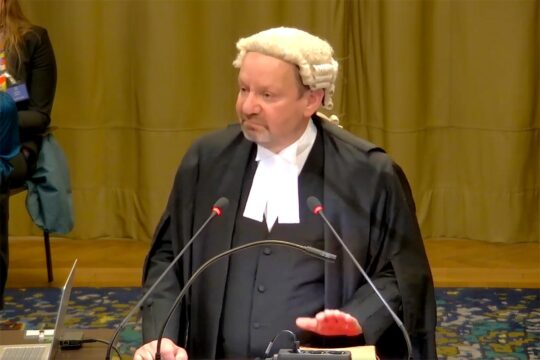"The Charter of the United Nations does not empower the Security Council to establish any criminal court," said counsel for Elizaphan Ntakirutimana, Ramsey Clark of the US. The court threw out the motion, citing previous decisions on motions challenging the jurisdiction of the UN's two ad hoc tribunals (Kanyabashi case at the ICTR and Tadic at the International Criminal Tribunal for former Yugoslavia). The judges said that the ICTR had been legally created by the UN Security Council and endorsed by the General Assembly. Defence for Ntakirutimana and his son were granted a request to have a copy of the so-called Hourigan memorandum related to the shooting down of former Rwandan president Juvénal Habyarimana's plane that sparked the 1994 genocide in Rwanda. The document, written by a former ICTR investigator (Michael Hourigan) suggests that the shooting down of the 'plane may have been the work of the Rwandan Patriotic Front (RPF) now in power in Kigali, rather than of extremist Hutus in the former regime. The contents of the memorandum have been published in the press, but the ICTR treats it as a confidential document. "We believe that it is the RPF that shot down the plane, and this has a great bearing on alleged genocidal intent by our clients," Gerald Ntakirutimana's American lawyer Edward Medvene told the court. Medvene also said he feared his client's trial would not be fair because it was difficult to access defence witnesses inside Rwanda. "We have never dreamed of talking to witnesses in Rwanda because I'm aware of the enormous risk it would pose to their lives," Medvene told the court. The court postponed the start of trial until September 17th, at the request of the defence. It had originally been scheduled for January this year, then put back to April 23rd. Medevene argued his wife's health problems, the difficulty of carrying out investigations, and the fact that neither lawyer yet has a co-counsel. Prosecution is expected to present 53 witnesses to support its case. The trial is before Trial Chamber One of the ICTR composed of judges Asoka de Zoysa Gunawardena of Sri Lanka (presiding in this case), Navanethem Pillay of South Africa and Erik Mose of Norway. GG/JC/FH (NK0402e)
Countries
- Afghanistan
- Algeria
- Angola
- Argentina
- Armenia
- Australia
- Austria
- Azerbaijan
- Bahrain
- Bangladesh
- Belarus
- Belgium
- Benin
- Bosnia & Herzegovina
- Brazil
- Burkina Faso
- Burundi
- Cambodia
- Cameroon
- Canada
- Central African Republic
- Chad
- Chile
- China
- Colombia
- Cote d’Ivoire
- Croatia
- Cyprus
- Dem. Rep. Of Congo
- Denmark
- Ecuador
- Egypt
- El Salvador
- Equatorial Guinea
- Eritrea
- Ethiopia
- Finland
- France
- Gabon
- Gambia
- Georgia
- Germany
- Ghana
- Greenland
- Guatemala
- Guinea
- Haiti
- Honduras
- Hungary
- Indonesia
- Iran
- Iraq
- Ireland
- Israel
- Italy
- Japan
- Jordan
- Kenya
- Kosovo
- Laos
- Lebanon
- Liberia
- Libya
- Lithuania
- Malaysia
- Maldives
- Mali
- Mauritania
- Mauritius
- Mexico
- Myanmar
- Namibia
- Nepal
- Netherlands
- New Zealand
- Nicaragua
- Niger
- Nigeria
- North Korea
- Norway
- Pakistan
- Palestine
- Peru
- Philippines
- Poland
- Republic of Congo
- Russia
- Rwanda
- Scotland
- Senegal
- Serbia
- Seychelles
- Sierra Leone
- Somaliland
- South Africa
- South Korea
- South Sudan
- Spain
- Sri Lanka
- Sudan
- Suriname
- Sweden
- Switzerland
- Syria
- Taiwan
- Tanzania
- Thailand
- Timor-Leste
- Togo
- Tunisia
- Turkey
- Uganda
- Ukraine
- United Arab Emirates
- United Kingdom
- United States
- Uruguay
- Vanuatu
- Venezuela
- Vietnam
- Yemen
- Zimbabwe



